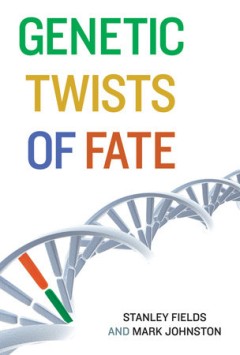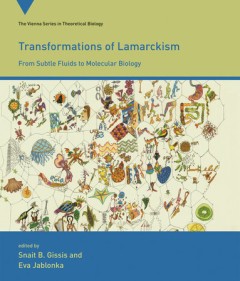Filter by

The genealogy of a gene :patents, HIV/AIDS, and race
In The Genealogy of a Gene, Myles Jackson uses the story of the CCR5 gene to investigate the interrelationships among science, technology, and society. Mapping the varied "genealogy" of CCR5 -- intellectual property, natural selection, Big and Small Pharma, human diversity studies, personalized medicine, ancestry studies, and race and genomics -- Jackson links a myriad of diverse topics. The hi…
- Edition
- -
- ISBN/ISSN
- 9780262327190
- Collation
- 1 online resource (xii, 336 pages) :illustrations, map.
- Series Title
- -
- Call Number
- -

Wheat Evolution and Domestication
This open access book covers a century of research on wheat genetics and evolution, starting with the discovery in 1918 of the accurate number of chromosomes in wheat. We re-evaluate classical studies that are pillars of the current knowledge considering recent genomic data in the wheat group comprising 31 species from the genera Amblyopyrum, Aegilops, Triticum, and other more distant relatives…
- Edition
- -
- ISBN/ISSN
- 978-3-031-30174-2
- Collation
- XXIII, 673
- Series Title
- -
- Call Number
- -

Mutation Breeding in Coffee with Special Reference to Leaf Rust
This open-access book provides a comprehensive overview of current methodologies for improving resistance to leaf rust in coffee, one of the world's most important cash crops and beverages. Coffea arabica L. (Arabica) accounts for about 60% of the world's coffee production. Coffee leaf rust (CLR), caused by the fungus Hemileia vastatrix is the major disease affecting Arabica coffee resulting in…
- Edition
- -
- ISBN/ISSN
- 978-3-662-67272-3
- Collation
- XX, 314
- Series Title
- -
- Call Number
- -

Evolution, the Extended Synthesis
Outgrowth of a meeting of the "Altenberg 16" at the Konrad Lorenz Institute for Evolution and Cognition Research in Altenberg, Austria, in July 2008. Cf. pref.In this volume, 16 leading evolutionary biologists and philosophers of science survey the conceptual changes that have emerged since Huxley's landmark publication, not only in such traditional domains of evolutionary biology as quantitati…
- Edition
- -
- ISBN/ISSN
- 9780262315142
- Collation
- 1 online resource (viii, 495 pages) :illustrations
- Series Title
- -
- Call Number
- -

Gene regulation and metabolism : postgenomic computational approaches
As exciting as the new field of genomics is, it has not yet produced a basic conceptual change in biology. The fundamental problems remain: the origin of life, cell organization, the pathways of differentiation, aging, and the molecular and cellular capabilities of the brain. What has occurred is an explosion of molecular information obtained by genomic sequences, which will soon be followed by…
- Edition
- -
- ISBN/ISSN
- 9780262270649
- Collation
- 1 online resource (x, 310 pages) : illustrations.
- Series Title
- -
- Call Number
- 570 GEN

Genetic twists of fate
How tiny variations in our personal DNA can determine how we look, how we behave, how we get sick, and how we get well.News stories report almost daily on the remarkable progress scientists are making in unraveling the genetic basis of disease and behavior. Meanwhile, new technologies are rapidly reducing the cost of reading someone's personal DNA (all six billion letters of it). Within the nex…
- Edition
- -
- ISBN/ISSN
- 9780262289382
- Collation
- 1 online resource (ix, 222 pages) :illustrations, map
- Series Title
- -
- Call Number
- -

Transformations of Lamarckism: From Subtle Fluids to Molecular Biology
This title shows the advantages of a Lamarckian perspective on evolution. Indeed the development-oriented approach it presents is becoming central to current evolutionary studies.OCLC-licensed vendor bibliographic record.
- Edition
- -
- ISBN/ISSN
- 9780262295642
- Collation
- 1 online resource (xvi, 457 pages) :illustrations.
- Series Title
- -
- Call Number
- -

DNA and the Criminal Justice System: The Technology of Justice
AnnotationOCLC-licensed vendor bibliographic record.
- Edition
- -
- ISBN/ISSN
- 9780262310604
- Collation
- 1 online resource (xviii, 414 pages) :illustrations.
- Series Title
- -
- Call Number
- -

Fables and futures :biotechnology, disability, and the stories we tell ourselves
How new biomedical technologies--from prenatal testing to gene-editing techniques--require us to imagine who counts as human and what it means to belong. From next-generation prenatal tests, to virtual children, to the genome-editing tool CRISPR-Cas9, new biotechnologies grant us unprecedented power to predict and shape future people.OCLC-licensed vendor bibliographic record.
- Edition
- -
- ISBN/ISSN
- 9780262351799
- Collation
- 1 online resource (240 pages).
- Series Title
- -
- Call Number
- -

Ethics, sexual orientation, and choices about children
Parents routinely turn to prenatal testing to screen for genetic or chromosomal disorders or to learn their child's sex. What if they could use similar prenatal interventions to learn (or change) their child's sexual orientation? Bioethicists have debated the moral implications of this still-hypothetical possibility for several decades. Some commentators fear that any scientific efforts to unde…
- Edition
- -
- ISBN/ISSN
- 9780262305822
- Collation
- 1 online resource (195 pages).
- Series Title
- -
- Call Number
- -
 Computer Science, Information & General Works
Computer Science, Information & General Works  Philosophy & Psychology
Philosophy & Psychology  Religion
Religion  Social Sciences
Social Sciences  Language
Language  Pure Science
Pure Science  Applied Sciences
Applied Sciences  Art & Recreation
Art & Recreation  Literature
Literature  History & Geography
History & Geography